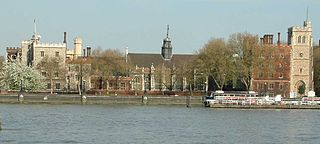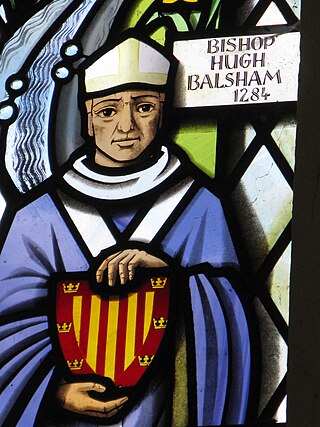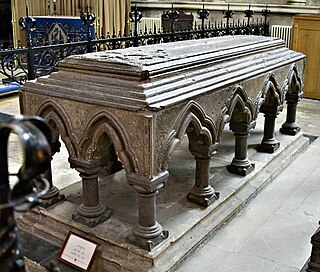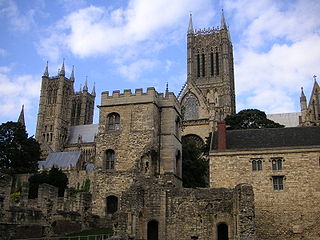Related Research Articles

Boniface of Savoy was a medieval Bishop of Belley in Savoy and Archbishop of Canterbury in England. He was the son of Thomas, Count of Savoy and owed his initial ecclesiastical posts to his father. Other members of his family were also clergymen, and a brother succeeded his father as count. One niece Eleanor of Provence was married to King Henry III of England, and another was married to King Louis IX of France. It was Henry who secured Boniface's election as Archbishop, and throughout his tenure of that office, he spent much time on the continent. He clashed with his bishops, with his nephew-by-marriage, and with the papacy but managed to eliminate the archiepiscopal debt that he had inherited on taking office. During Simon de Montfort's struggle with King Henry, Boniface initially helped Montfort's cause but later supported the king. After his death in Savoy, his tomb became the object of a cult, and he was eventually beatified in 1839.

Hugh de Balsham was a medieval English bishop.
Robert Winchelsey was an English Catholic theologian and Archbishop of Canterbury. He studied at the universities of Paris and Oxford, and later taught at both. Influenced by Thomas Aquinas, he was a scholastic theologian.

William of Kilkenny was a Lord Chancellor of England and Bishop of Ely.

Sewal de Bovil was a medieval Archbishop of York.

Godfrey Ludham was Archbishop of York from 1258 to 1265.
William de Wickwane was Archbishop of York between 1279 and 1285.
Jocelin of Wells was a medieval Bishop of Bath. He was the brother of Hugh de Wells, who became Bishop of Lincoln. Jocelin became a canon of Wells Cathedral before 1200, and was elected bishop in 1206. During King John of England's dispute with Pope Innocent III, Jocelin at first remained with the king, but after the excommunication of John in late 1209, Jocelin went into exile. He returned to England in 1213, and was mentioned in Magna Carta in 1215.
John Blund was an English scholastic philosopher, known for his work on the nature of the soul, the Tractatus de anima, one of the first works of western philosophy to make use of the recently translated De Anima by Aristotle and especially the Persian philosopher Avicenna's work on the soul, also called De Anima. He taught at Oxford University along with Edmund of Abingdon. David Knowles said that he was "noteworthy for his knowledge of Avicenna and his rejection of the hylomorphism of Avicebron and the plurality of forms.", although the problem of the plurality of forms as understood by later scholastics was not formulated explicitly in Blund's time. Maurice Powicke calls him the "first English Aristotelian."
Walter of Kirkham was a medieval English official who held the positions of Keeper of the Wardrobe, Dean of York, and Bishop of Durham. He was elected bishop over Aymer de Valence, 2nd Earl of Pembroke, the brother of King Henry III. As bishop, he was instrumental in the founding of Balliol College in the University of Oxford.
Robert of Holy Island was a medieval Bishop of Durham.
Roger Niger was a thirteenth-century cleric who became Bishop of London. He is also known as Saint Roger of Beeleigh.
William of Bitton was a medieval English Bishop of Bath and Wells.
William of Bitton was a medieval Bishop of Bath and Wells.
Hugh of Beaulieu was a medieval English Bishop of Carlisle.
Robert de Chauncy was a medieval Bishop of Carlisle.
Simon of Wells was a medieval Bishop of Chichester.

William of Louth, also known as William de Luda was a medieval Bishop of Ely.

Hugh of Wells was a medieval Bishop of Lincoln. He began his career in the diocese of Bath, where he served two successive bishops, before joining royal service under King John of England. He served in the royal administration until 1209, when he was elected to the see, or bishopric, of Lincoln. When John was excommunicated by Pope Innocent III in November 1209, Hugh went into exile in France, where he remained until 1213.
John Crakehall was an English clergyman and Treasurer of England from 1258 to 1260. Possibly the younger son of a minor noble family in Yorkshire, Crakehall served two successive bishops of Lincoln from around 1231 to the 1250s. He then became an archdeacon in the diocese of Lincoln before being named as treasurer, where he served until his death in 1260. He owed his appointment to the treasurership to a number of factors, including his reputation for administrative ability and his relationship with the leader of the baronial effort to reform royal government. While in office, he strove to improve the administration of the exchequer as well as collect outstanding debts to the government and improve royal revenues.
References
- Franklin, R. M. (2004). "Farnham, Nicholas of (d. 1257)" . Oxford Dictionary of National Biography. Oxford University Press. doi:10.1093/ref:odnb/20089 . Retrieved 24 January 2008.(subscription or UK public library membership required)
- Ferruolo, Stephen C. (1988). ""Quid dant artes nisi luctum?" Learning, Ambition, and Careers in the Medieval University". History of Education Quarterly. 28 (1): 1–22. doi:10.2307/368281. JSTOR 368281.
- Fryde, E. B.; Greenway, D. E.; Porter, S.; Roy, I. (1996). Handbook of British Chronology (Third revised ed.). Cambridge, UK: Cambridge University Press. ISBN 0-521-56350-X.
- Greenway, Diana E. (1971). "Durham: Bishops". Fasti Ecclesiae Anglicanae 1066-1300. Vol. 2: Monastic Cathedrals (Northern and Southern Provinces). Institute of Historical Research. Archived from the original on 19 July 2011. Retrieved 25 October 2007.
- Moorman, John R. H. (1955). Church Life in England in the Thirteenth Century (Revised ed.). Cambridge, UK: Cambridge University Press. OCLC 213820968.